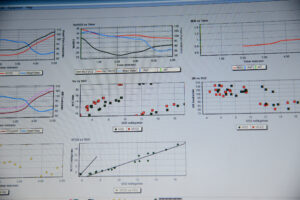Keeping your data safe – Data Management Framework

NC State’s Data Management Framework (DMF) classifies data into different levels with different cybersecurity requirements for each, as reviewed in REG 08.00.03, Data Management Regulation. It is your responsibility to know and implement cybersecurity best practices in your work process. These are the university’s data classification levels and appropriate data storage for each:
- Purple: Ultra-sensitive
Ultra-sensitive data includes data where unauthorized disclosure or loss poses the highest risk or impact to the university or its affiliates or where specific data categories require special privileged access management. Examples include social security numbers, passwords, encryption keys, and biometrics (such as fingerprints and iris scans).
Additional access and handling requirements are required for Ultra-sensitive data because it may be impossible to repair damage caused by its unauthorized disclosure.
This data cannot be stored in G Suite applications, only OIT managed department and share drives, with approval - Red: Highly sensitive
Highly sensitive data includes data where unauthorized disclosure or loss poses a high risk or impact to the university or its affiliates. Examples include driver’s license, mother’s maiden name, passport, and immigration number.
This data can be stored in select G Suite applications - Yellow: Moderately sensitive
Moderately sensitive data includes data where unauthorized disclosure or loss poses a moderate to low risk or impact to the university or its affiliates. Examples include date of birth, race, gender, and transcripts.
Data that is created or collected within the university’s data environment without having been classified by the data stewards must be controlled at a minimum as moderately sensitive/yellow until final classification is assigned.
This data can be stored in most G Suite applications
- Green: Not sensitive
Not Sensitive data includes data where unauthorized disclosure or loss poses a low risk or impact to the university or its affiliates. This information may be disclosed to individuals regardless of their university affiliation. Minimal security measures are needed to control the unauthorized modification, use, or destruction of this data.
This data can be stored in all G Suite applications
There are different cybersecurity controls for endpoints (desktops, laptops, smartphones) and IT infrastructure (multi-user applications, servers, storage platforms).
- RUL 08.00.18 – Endpoint Protection Standard
- RUL 08.00.16 – NC State University Security Standards for Sensitive Data and System
As a takeaway – ask yourself if you really need particular data points. If not, do not collect or store them and discard records in accordance with the university record retention guidelines.
Let the data tell the story – Data Displays
 Numbers, data, and metrics ultimately inform policy, procedure, or programs in our operations. How we communicate the data story to our peers and campus partners is as important as the raw numbers, data, and metrics. Adding visualizations to your data aids in understanding data trends and their causations that you are conveying. Using Google Sheets is a great starting point for quick internal data visualization. Looker Studio, builds off of Google Sheets for developing interactive dashboards and reports. From simple to complex data storytelling, this tool uses templates and simple data connections for novice users.ArcGIS Online, a cloud-based geographic information system tool, is used for sharing interactive web maps with data points. Recently, ArcGIS Online has switched to Single-Sign-On (SSO), making it even easier for NC State students, faculty, and staff to utilize ArcGIS Online. This tool is used in mapping AEDs, blue light phones, building occupancy, and environmental programming, among other use cases on campus.
Numbers, data, and metrics ultimately inform policy, procedure, or programs in our operations. How we communicate the data story to our peers and campus partners is as important as the raw numbers, data, and metrics. Adding visualizations to your data aids in understanding data trends and their causations that you are conveying. Using Google Sheets is a great starting point for quick internal data visualization. Looker Studio, builds off of Google Sheets for developing interactive dashboards and reports. From simple to complex data storytelling, this tool uses templates and simple data connections for novice users.ArcGIS Online, a cloud-based geographic information system tool, is used for sharing interactive web maps with data points. Recently, ArcGIS Online has switched to Single-Sign-On (SSO), making it even easier for NC State students, faculty, and staff to utilize ArcGIS Online. This tool is used in mapping AEDs, blue light phones, building occupancy, and environmental programming, among other use cases on campus.
Balancing the workload – Project Management Opportunities
 So many lists, sticky notes, and whiteboard thoughts to manage? Program management software can help plan, organize, and manage resources in order to meet goals. Try out these project management tools below, or find one that works for you and your team.
So many lists, sticky notes, and whiteboard thoughts to manage? Program management software can help plan, organize, and manage resources in order to meet goals. Try out these project management tools below, or find one that works for you and your team.
Google Keep is a personal project management tool that allows for note taking, and task completion tracking. This is available in NC State’s G-Suite options. Monday is a workflow tracking service, providing users and teams simple visualizations of a project’s progress. This is a fee based service, with a trial option for test runs. Trello is a productivity powerhouse, using dashboards, lists, and cards to manage and share projects. This is a fee based software, but available for EH&PS. Google Tables is a nearly launched beta product, moving towards being a fully-supported Google Cloud product that visually depicts a project’s progress. This is available in NC State’s G-Suite options.
